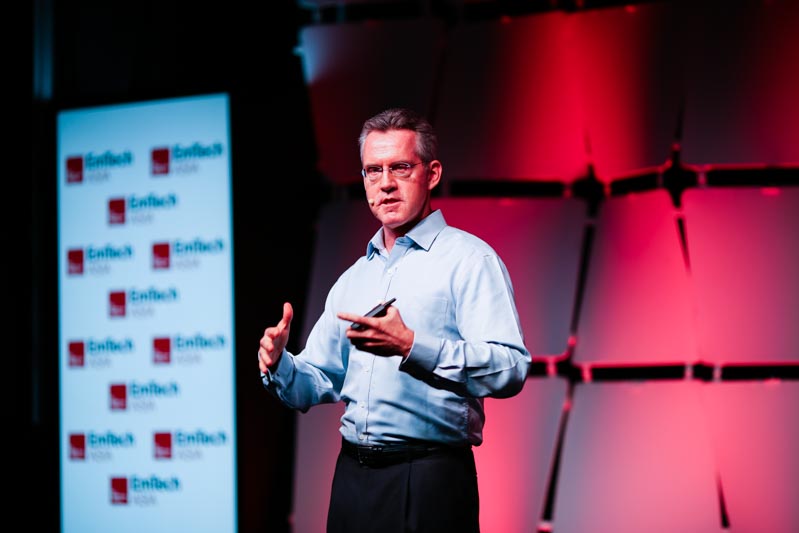
OpenGov was at EmTech Asia 2017 (14 Feb-15 Feb) where Mr. Steve Leonard (above photo), founding Chief Executive of SGInnovate, gave a presentation on the theme of innovation in Singapore. SGInnovate was launched in November 2016 with the aim of helping ambitious and capable people to build ‘deep-tech’ products borne out of science research, utilising the full power of the Singapore ecosystem to achieve the said mission. Mr. Leonard spent some time with OpenGov as he shared more about the goals, challenges and ongoing projects at SGInnovate.
How would you describe SGInnovate in one sentence?
It’s our goal to work with ambitious and capable men and women to build globally relevant products and companies. The other thing I need to do is probably insert the word “technology” in there somewhere because clearly it’s not our goal to build a cosmetics company or food company.
What is your mandate as the Founding CEO of SGInnovate?
That, which is to help ambitious and capable men and women to build globally relevant tech-bases products and companies. So the mandate is to make that possible so I try, together with the team, to bring together those people, those resources to make that possible: investors, mentors, corporates and governments. The answer is how we can use the assets and resources available to us to pursue that mission.
SGInnovate was launched in November 2016. It’s such a new organisation – in the next 1-3 years, what are some of the goals of SGInnovate?
So, two things, even though we only launched in November last year, we’ve been working for months and months before that in the build-up. Number two is that we’ve been building up from the work from the former Infocomm Investments, so we’re not starting from scratch. A lot of what we’re trying to do now is continue bringing the networks together.
Here’s the way I would describe it. If you think about all the students who are in universities and polytechnics, that represents a community. If you think about the corporations, that represents a community. Researchers, are a community. So without getting too granular, it’s not like we only need computer science graduates out of NUS, we need all kinds of great university students, right? So part of what we want to do is to bring these communities into closer contact, because from those contacts, intersections, which is a lot more challenging than it might sound, we see some exciting things happening. Quick example – we will have a researcher from one of the universities, we’ll have a professor from maybe a different university, we’ll have an investor that likes to put money into some of these early stage technically-founded companies. We’ll have a few people that might be designers or social thinkers, like how does the technology become adopted. We try to put these different people and say, “Let’s try and build this.”
Singapore does not lack anything, I think that’s the real important point. So if I can do one thing in my time at SGInnovate, it’s to try to make a contribution to the belief that Singapore has the capabilities and the resources to build globally relevant technology-based products. It’s quite amazing to me – how many people are looking for where’s the gap?
A lot of people start off assuming they don’t have a lot of money – we do, or assuming they don’t have enough ambitious people- we do, but sometimes those people may not know how to start it. We actually have no excuse, I’d say. We just need to say, “Let’s go.”
If I can do anything, it’s trying to make a positive contribution in that.
You spoke a lot about the public and private sectors coming together. In your experience, how do you think the models of collaboration and public-private partnerships are changing in the current age of digital innovation and disruption?
When I think of the public sector and governments around the world, they have always played an important role in the advancement of science and technology because government tends to be a big investor, governments tend to be big buyers. Governments tend to have the needs that perhaps private sector doesn’t have. When you think of the military, when you think of big issues like water purification or food safety, that’s not really a private company’s concern. Food safety for a nation, that’s government. So governments anywhere have played a really important role.
But it’s changing now, sometimes citizens anywhere in the world are like, “What have I got for this money?” or “Speed up, what’s happening now?” I think in the past, there was this idea that governments in the world knew what was good and would take some time to ultimately do big things, like the example I shared about the space programme. That was a huge part of the US government federal budget but at the end of the day, citizens were like, “Let’s go for it, sounds amazing.”
Now, probably will be harder, people would say, “Sounds wasteful, what’s the real purpose?” So I think that’s changing somewhat but I think it’s important that we don’t lose the ambition on any of these things. Smart Nation for Singapore was outlined by Prime Minister Lee a few years ago as big things – how do we do big things? So I think governments still have this “let’s go for it” mentality but of course, some of the “how”, in fact the large part of the how comes from private sector. If you think of it, it’s how the government build the roads but all the shops, petrol stations and hotels…if you think of it as one motorway – government might build the waterway but all the value-add and everybody around that, it’s private sector. That’s where we want to try to bring people together.
It’s not so much that the private sector just “does” but the “do” is largely private sector. That’s why it’s so great for the economy because government can say, “Let’s do this thing and here’s some funding I want to commit,” then companies grow and get that business. The space program spawned thousands of companies that went on to have their own inventions and own work. When we use this expression of public and private partnership, sometimes that’s misunderstood as some sort of welfare, like government gives money to private sector but there’s actually this energy, new ideas, debate and best outcomes. So I think governments always have a role to play because they can take a longer, more strategic view than sometimes, say private companies can take. And government can fund things that are harder and less certain than a private company can take.
Are there any ongoing projects or developments which are happening at SGInnovate that you can share about?
We’re, today, working with early stage founders on computer vision, on natural language processing, on machine learning, so if you take those three together, it adds to the Artificial Intelligence tag. We’re working with people on virtual reality, we’re working with people in communications and satellite communications. We’re also working with people on biomedical too. We don’t worry much about new ideas, we find so much already in Singapore. I lived here 16 years, I know a lot of people but every single day I meet somebody I didn’t know and they say, “I’m working on this.”
“That sounds amazing, who’s working with you on this? Why doesn’t anybody know about it?” Frankly, I don’t think our problem is trying to dream up something, there’s lots of people who have little things they’re been trying to work on but not necessarily know where to take them and where to go. It’s fine when you say here’s a big giant government programme but that’s sometimes hard to know how to relate.
So we’re trying to do is to be the partner or teammate of the entrepreneur, which means to say we try to know all the entrepreneurs and we try to be entrepreneurial, which is, we understand what you’re going through… SGInnovate is the same thing in a way, which is, we’ve been working on getting our funding tied down, working on who do we take as our first and second customers, how do we think about our product fit, are we doing the right things for a startup? Should we change what we are doing? These are the things a startup does and it’s the same thing for us. What we’re doing is saying, we’re not a government agency listing a long programme or whatever, we’re saying, what do you need for your company?
What does innovation mean for you in the context of Singapore?
From my perspective, innovation is a really difficult term to define because some people think of it as anything that’s different from what’s happened before, whether it’s 1% different or 98% different. I tend to think of innovation as something that’s more ambitious and I would like for us as a team and for us as Singapore, to be thinking about that ambition of innovation – it may not have to be one giant leap, it might have to be done in steps, that’s fine. Ambition doesn’t have to be one giant thing but if we set our ambition too low, that to me is not the innovation we strive for. For us, innovation is, “Think big and try.” Our biggest challenge is being open to try.
You spoke about startups. What are your thoughts on the tech startup scene in Singapore?
It certainly changed a lot in the last few years – a lot more activity, a lot more people. It really was something where Block 71 was the main show in town and now there’s spaces everywhere: The Great Room, Collision 8…a lot more activity, investors and awareness. It has changed a lot in that sense but we have a lot more to go and a lot more to do, which is not so much Singapore building a great ecosystem within Singapore but how do we have people say, “I need to go to Singapore if I want to build this amazing company.”
Today, all roads lead back to Silicon Valley but I would like them to do is to say, “I really want to build an outstanding global company and I think Singapore is a great place from which to do that.”
Our challenge is sometimes our entrepreneurs say, “How can we build great company for Singapore?” But we don’t think about how we can build great companies for the world.
There’s a lot more activity in the startup scene as I mentioned earlier, that will continue and we have already seen that change. Now the question is if we can do it in the sciences area that has historically been in the domain of the universities and professors. We’re seeing plenty of activity in e-commerce and fintech but this idea of deep tech, advanced tech or science-based tech, not so much yet. That’s the part we’re trying to push hard.




















